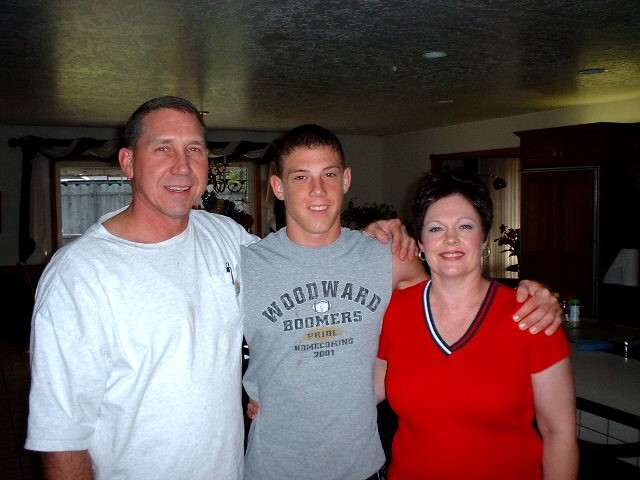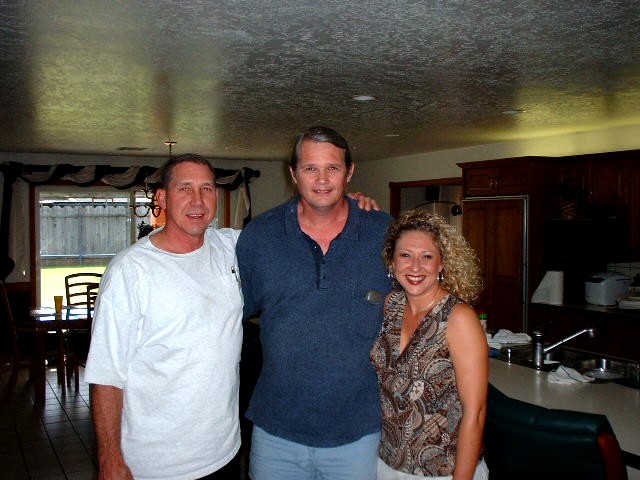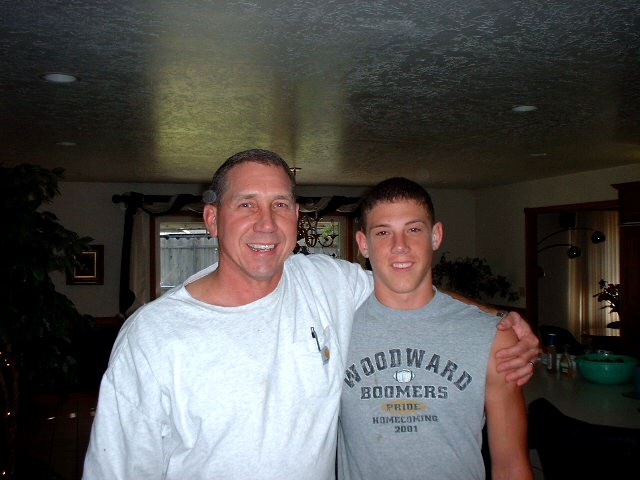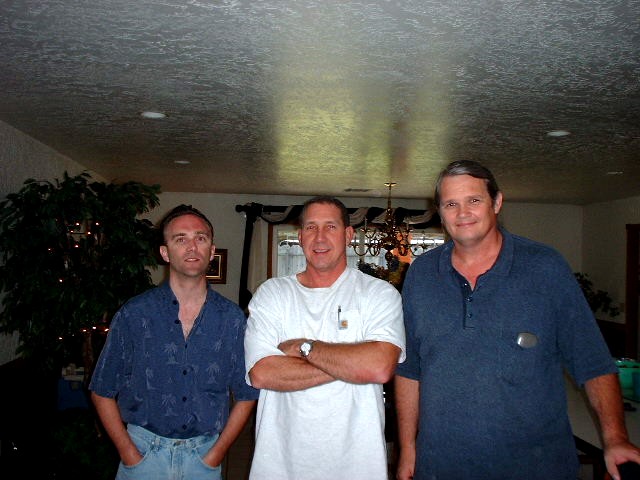

Posted by Wayne Parham [ 66.139.39.71 ] on September 27, 2004 at 00:45:25:
This month, the Great Plains Audio Club meeting was at Link Alley's house in Woodward, Oklahoma. Attendance was lower than most meetings, I think probably because of the distance involved. But for all of those that couldn't make it - You really missed out. So I will proceed now to rub it in. 
I'm telling you, everything about this day was wonderful. The drive was beautiful, Link and his family are wonderful and Link's sound systems are excellent. So I really enjoyed a pleasant day.
I wanted to ride my motorcycle and enjoy the scenery on the way over. Of course, that meant the ride home would be brisk, because the valley air gets pretty chilly in fall evenings. But the afternoon was warm and sunny.
A funny personal story, and part of the reason I wanted to ride, was that I've never been west of Highway 35 in Oklahoma. It's funny because I've been lots of places in the world, but I haven't even visited the Glass Mountains in my own home state. So I wanted to take this opportunity to enjoy the scenery as well as the company of Link and his family.
I was stunned. We passed through about 25 miles of the most beautiful land I've ever seen. There are several exposed strata of brilliant glass, layered in different colors. Rumor has it the glass was formed in a previous era of a long forgotten people. They got tired of high taxes and endless political rhetoric on their televisions, so they detonated a large nuclear bomb that made the glass. This, of course, ceased all divisive political talk and talk of any kind for that matter. The land was quiet and beautiful, leaving only these lovely mountains on a quiet planet. It was proof positive that nukes can be a good thing. OK, so that didn't really happen. The truth is that the mountains have a high selenite content, making them appear as if they were covered with pieces of glass. A giant inland sea once covered the area, leaving behind extensive gypsum beds. A "painted desert" effect can be seen in many locations due to the exposure of different rock strata, and the sparkle of gypsum and selenite gives many of the mesas a glittering effect. That's what they say is the real reason for the mountains. When we arrived at Link Alley's house, Norris Wilson and I were greeted by the charming Alley family. I was impressed again. Link has the nicest family, and they treated us to spagetti made by his darling daughter Stacy. Link's family could qualify as a school district all on it's own - He and his lovely wife Linda had 9 children! We shared the afternoon with Link, his wife Linda, his daughter Stacy and his son, Anthony, who I understand is the local hero on the Woodward high school football team. I got a little bit of sun on the forehead during the ride, didn't I? No sun under the glasses though; The truth is I looked like a freaking racoon. After eating a magnificent spagetti dinner, we retired to the listening room. Actually, Link has two listening areas setup, a main listening room and a smaller upstairs entertainment/home theater area. We spent some time in both, but the majority was spent with his "baby," which has a pair of completely reworked Klipschorns and three amplifiers. The three amplifiers aren't setup as biamp or triamp; Instead, Link switches between them as the mood strikes him. In fact, his Klipschorns aren't even three-way speakers anymore - they're configured as two-way speakers. Some people feel that hifi setups using horns must be three-way or four-way to fully cover the audio band. One listen to Link's system will change your mind. He has replaced the original K33 woofer with JBL E145's. This is a distinct improvement. Stock Klipshorns sound excellent, but the JBL's are in a different league altogether. The reduction in distortion is immediately obvious. They sound more powerful and at the same time, much cleaner. But even more striking in this case is the TAD 4001's he uses on top. Link has modified the stock midrange horn to accept the TAD 4001, and he did it well. He didn't neck down with an adapter - That would have really been the wrong way to do this. The stock horn has a tiny 5/8" throat, and his TAD's are the big two inchers. So what he did was to have the horns cut at the point where the cross-section is 2" diameter, and have a mounting flange professionally attached at a fiberglass shop. The net result is striking. I didn't bother to model the horn to understand its behavior, but my ears told me it was right. That's not very scientific, I know. But I'm pretty confident that measurements would confirm it to be a very good setup. We did some chicken-scratch-on-a-napkin analysis and found that the horn might be undersized but probably made up for by being in quarter-space or nearly quarter-space. The horn is baffle mounted, of course, and also the distance to the walls is just about a quarter-wavelength at the crossover point. So there is probably some boundary reinforcement at the bottom end where it needs it. And TAD 4001 beryllium diaphragms go way up, so there's no need for an additional smaller driver acting as a super-tweeter. Beyond all of that, it sounds amazing. Voices from a TAD 4001 sound better to me than most compression drivers run low. Link only runs about 10 watts to them, so his first-order crossovers and low cutoff point have not proven to be a problem. It sounds very, very good. Link has two excellent homebrew tube amplifiers that are based on push-pull 6A3's. Those are like 2A3's but with a 6 volt heater. They sounded great to me. I like SET 2A3's very much, but they can't offer much power. The push-pull 6A3 gives more power and also seems to have more control down low. This is often the case with push-pull amps and larger transformers. Link's amps were built by Kevin Morris in Des Moines, Iowa. He uses a 6BL7 input tube and puts the circuit on a black metal chassis. I was really impressed with these amps, and Link must have been too, because he bought two of them. For his source, he uses a California Audio Labs CL-15 CD player. The other amp that Link has is a Mark Levinson 29, which is a Class A solid state amp. I like this amp too. It sounds very clean and refined, even analytical compared to the tube amps. The Levinson sounded more accurate to me while the Morris amps sounded more warm. But Link and Norris thought the Morris was more accurate. I liked each of the amps a lot, and found each to have it's own better traits. To me, the tube amps sounded nicest with vocals. This is especially true of certain male vocalists, like Frank Sinatra and Nat King Cole. Lots of female vocalists benefit from tubes too, and I think this is why high-end microphones with tubes are so coveted. They do something with voice that just sounds very pleasant to most people. That's all speculation on my part, but I think most people hearing a vocalist through a nice tube system will prefer the sound to one played through a nice solid state system. Still, the Levinson sounded really nice to me too. It's more analytical, sure. Some will say that's better. Some will say it's not. Some will argue that the tubes added something to the signal, and that makes them less accurate. Others will say that the transistors are what added something, and that they're not natural. But no matter what camp a person finds himself in, the bottom line for me is the sound of both systems is really good. I personally preferred the Morris amps when we played some music, especially that rich with vocals and certain instruments. I liked the Levinson too, particularly with symphony pieces. But I think I would have been very happy with either and I can see why Link likes to have each of these systems ready at the flick of a switch.
[ PiSpeakers Forum ] [ Help ]
Oklahoma Glass Mountains

Link Alley, his son Anthony and his wife, Linda

Link Alley, Norris Wilson and Stacy Alley

Link and Anthony - Like father, like son

Three Amigos - Wayne Parham, Link Alley and Norris Wilson